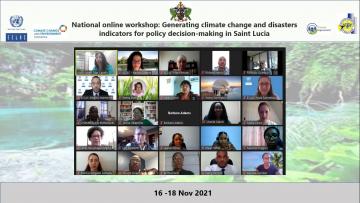Context
Availability of quality statistics and indicators are crucial to effectively respond to the effects of climate change and build resilience. In this regard, Saint Lucia has put a National Environmental Information System (NEIS) in place, and it has a dedicated section on environment statistics on the Central Statistical Office website. However, Saint Lucia faces statistical and institutional challenges like other Caribbean SIDS. Therefore, there is a need to enhance the production and use of environment, climate change and disasters indicators to draw attention to national priorities and better engage in adaptation to climate change processes.
Objectives
- Train the participants to build selected environment, climate change and disaster indicators and their metadata.
- Identify data and capacity gaps to improve the Environmental Information System (EIS) and build a regional resilience platform.
- Have a better understanding of how geospatial data can enhance the use of environment, climate change and disaster indicators for effective decision making.
Expected outcomes
- At least three prioritized climate change or disasters indicators and their metadata are available at the end of the workshop.
- A list of relevant and prioritized climate change and disasters indicators for Saint Lucia linked to the Paris Agreement and the Global Set on Climate Change Indicators and Statistics of the theUNSD.
- Follow up steps to build further selected climate change and disasters indicators are agreed upon with the CSO and key stakeholders.
Workshop materials and further information are available at the following link: https://www.cepal.org/en/events/saint-lucia-national-workshop-generatin…;
Programa
